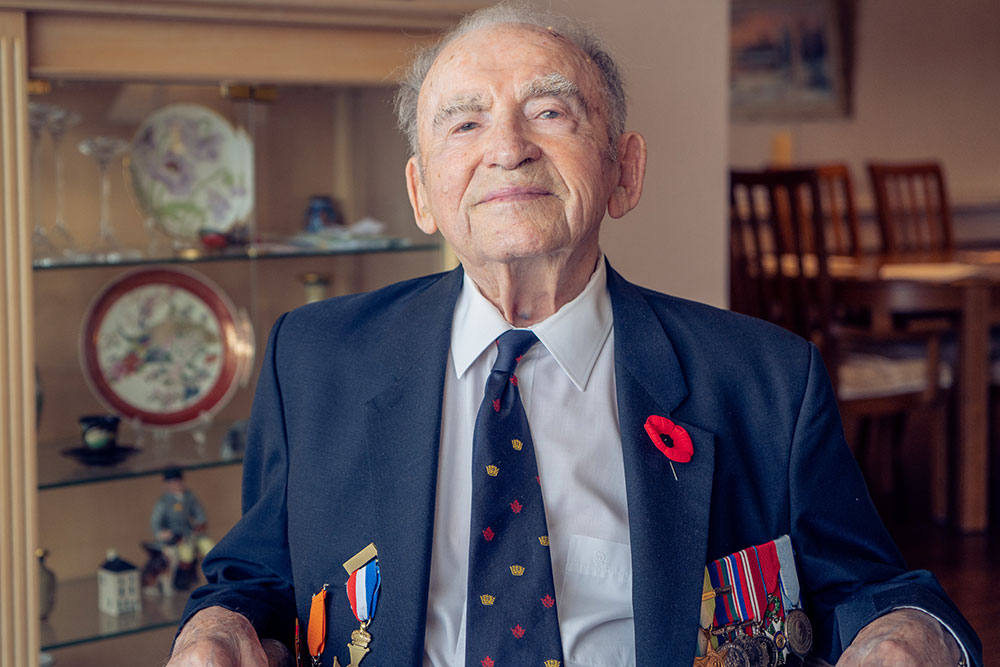Able Seaman Alex Polowin’s war ended in Halifax.
Not yet 20, the D-Day veteran stared out toward the many ships “tied up with no crew,” the demobilization process well underway, and wondered, “Where now?
“That’s very, very frightening,” Polowin, a survivor of the Arctic convoys, recalled of the moment during his interview for the Canadian War Museum’s recently unveiled oral history project. “What am I going to do for the rest of my life?”
It was, and remains, a sentiment shared by countless Canadian Armed Forces members, a question not easily answered and yet, so immensely in need of addressing once military service draws to a close. It is, perhaps, a fear incomparable to that which is expected while the uniform is still on.
Such challenges have since been preserved and highlighted through the initiative entitled In Their Own Voices: Stories from Canadian Veterans and their Families. Focused primarily on the post-military transition back to civilian life, the collection features more than 200 interviews with those whose trajectories were impacted by the Second World War and beyond to modern-day service, each account offering a personal insight into what can happen after that uniform comes off—and, potentially, contributing to a much broader blueprint for future veterans’ support.
“Most military histories end when the conflict or era being discussed ends,” explained the project leader and the Canadian War Museum’s historian of veterans’ experience Michael Petrou. “But we understand that the ripples of war and military service continue much longer than that and typically shape the lives of veterans, as well as their families, in often profound and intimate ways.”
No stranger to such ripples, Petrou recalled his original curiosity being sparked in part by his WW II veteran grandfather, a figure he “was always fascinated by as a boy” and who “right up until his death, [carried] a 1939 silver dollar in his wallet that was given to him by his high school teacher around the time he enlisted.”
Petrou rarely heard about the war’s lasting impact from his grandfather’s own lips, nor did he ever really ask much about the silver dollar he kept in his pocket.
I spoke to one veteran who said he lived in a city of a million people where he felt no one knew what he did.
Now, however, the In Their Own Voices project—started in early 2022 with an online exhibition unveiled in late 2024—has since captured the post-service memories, both positive and negative, of people with a similar dynamic.
People such as Max Dankner, who also served in the Second World War before returning home, only to be found by his mother hiding beneath the bed.
Or like Bruce Henwood, a former UN military observer who, in 1995, became a double below-knee amputee after his vehicle detonated a mine in Croatia and thrust him into a fight against insurers to receive the compensation he deserved.
Or Kelly Thompson, a Canadian captain compelled to enlist after the 9/11 attacks, but whose encounters with sexism and a career-altering wound left her untethered from her military identity until creative writing helped her feel grounded again.
In recording veterans’ accounts, Petrou recognized common themes across generations, conflicts and eras, particularly that “losing someone close to you in war is universal” and how that imprints itself in a post-conflict setting. Camaraderie in the military was another oft-discussed topic for interviewees.
Equally, the military-to-civilian workforce transition unearthed parallels.
“Veterans I’ve talked to often say that they learned useful skills in the forces,” said Petrou, acknowledging the instances where abilities were less readily transferrable.
But there were likewise marked differences.
“The Second World War veterans, for example, were part of a conflict in which almost the entire country was involved; it was always visible,” noted Petrou. “Then you have the Afghanistan War, a conflict that we lost. I spoke to one veteran who said he lived in a city of a million people where he felt no one knew what he did.”
The diverse nature of the country, too, became a factor—and indeed an occasional challenge when Petrou travelled from coast to coast collecting first-hand accounts: “Even with over 200 interviews, it’s hard to get the totality of experience, be it anglophone, francophone, racialized communities, gender, service branches, conflicts, eras and more. To reflect that scope honestly was quite difficult.”
Nevertheless, each perspective, each story, has woven a tapestry of post-service experience that can shed light on a seldom examined aspect of military life, not only from veterans’ lips, but also those loved ones who shared in it.
In humanizing individual achievements and struggles, all the while hearing about them in their own voices, a compelling archive has been created that Petrou and the museum team hope will broaden understanding for generations moving forward.
Now is undoubtedly the time, especially for WW II-era service members.
“I interviewed somewhere between 40 and 50 Second World War veterans,” said Petrou. “Sadly, even over the last couple of years, many of them have died.”
They include Alex Polowin, whose memory lives on through the online exhibition where recordings and photographs lend a richness to his immortalized account.
Additionally, with plans underway to host a conference in 2025 and publish a “hybrid” academic-memoir book in 2026, the In Their Own Voices project will continue to grow, supported by The Royal Canadian Legion and the Legion National Foundation.
“The Legion has been a generous funder of the project,” said Petrou, “and has been a great supporter in terms of spreading the word and reaching out to people.”
Whether the archive could one day influence policy decisions is left to speculation for now. What’s certain is its potential as a valuable resource for historians, authors, journalists, and the public, not least educators and students.
“My wish is that these transcripts and interviews have second, third, and fourth lives in ways we haven’t yet imagined,” said Petrou. “We’ll just have to see.”
Advertisement




















